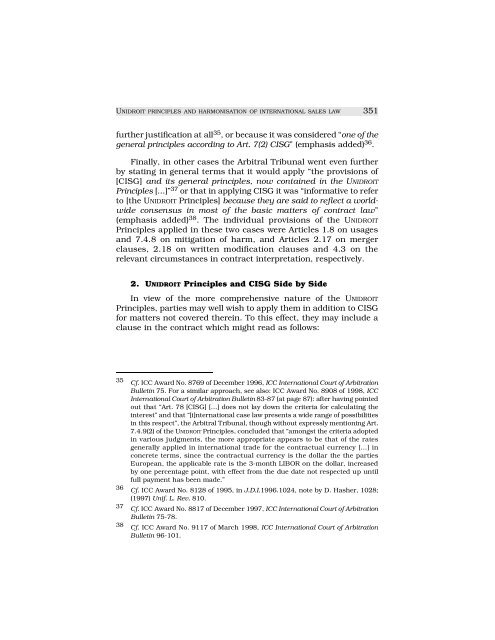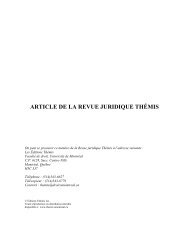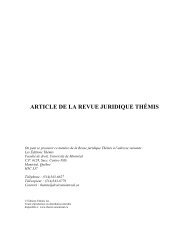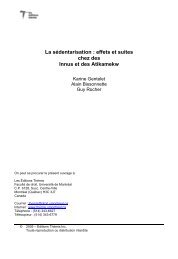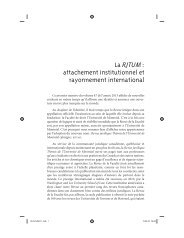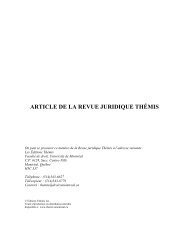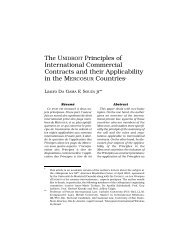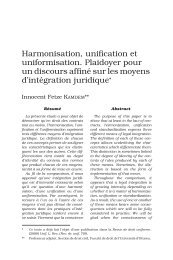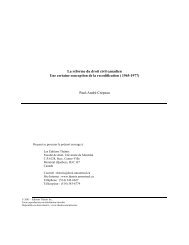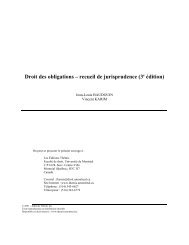The UNIDROIT Principles of International Commercial Contracts and ...
The UNIDROIT Principles of International Commercial Contracts and ...
The UNIDROIT Principles of International Commercial Contracts and ...
Create successful ePaper yourself
Turn your PDF publications into a flip-book with our unique Google optimized e-Paper software.
<strong>UNIDROIT</strong> PRINCIPLES AND HARMONISATION OF INTERNATIONAL SALES LAW 351<br />
further justification at all 3 5 , or because it was considered “one <strong>of</strong> the<br />
general principles according to Art. 7(2) CISG” (emphasis added) 36 .<br />
Finally, in other cases the Arbitral Tribunal went even further<br />
by stating in general terms that it would apply “the provisions <strong>of</strong><br />
[CISG] <strong>and</strong> its general principles, now contained in the UN I D R O I T<br />
<strong>Principles</strong> [ . . . ] ” 3 7 or that in applying CISG it was “informative to re f e r<br />
to [the <strong>UNIDROIT</strong> <strong>Principles</strong>] because they are said to reflect a worldwide<br />
consensus in most <strong>of</strong> the basic matters <strong>of</strong> contract law”<br />
(emphasis added) 3 8 . <strong>The</strong> individual provisions <strong>of</strong> the UN I D R O I T<br />
<strong>Principles</strong> applied in these two cases were Articles 1.8 on usages<br />
<strong>and</strong> 7.4.8 on mitigation <strong>of</strong> harm, <strong>and</strong> Articles 2.17 on merg e r<br />
clauses, 2.18 on written modification clauses <strong>and</strong> 4.3 on the<br />
relevant circumstances in contract interpretation, respectively.<br />
2. <strong>UNIDROIT</strong> <strong>Principles</strong> <strong>and</strong> CISG Side by Side<br />
In view <strong>of</strong> the more comprehensive nature <strong>of</strong> the <strong>UNIDROIT</strong><br />
<strong>Principles</strong>, parties may well wish to apply them in addition to CISG<br />
for matters not covered therein. To this effect, they may include a<br />
clause in the contract which might read as follows:<br />
35 C f. ICC Aw a rd No. 8769 <strong>of</strong> December 1996, ICC <strong>International</strong> Court <strong>of</strong> Arbitration<br />
Bulletin 75. For a similar approach, see also: ICC Award No. 8908 <strong>of</strong> 1998, ICC<br />
I n t e rnational Court <strong>of</strong> Arbitration Bulletin 83-87 (at page 87): after having pointed<br />
out that “Art. 78 [CISG] […] does not lay down the criteria for calculating the<br />
i n t e rest” <strong>and</strong> that “[i]nternational case law presents a wide range <strong>of</strong> possibilities<br />
in this respect”, the Arbitral Tribunal, though without expressly mentioning Art.<br />
7.4.9(2) <strong>of</strong> the UN I D R O I T <strong>Principles</strong>, concluded that “amongst the criteria adopted<br />
in various judgments, the more appropriate appears to be that <strong>of</strong> the rates<br />
generally applied in international trade for the contractual currency […] in<br />
c o n c rete terms, since the contractual currency is the dollar the the parties<br />
E u ropean, the applicable rate is the 3-month LIBOR on the dollar, incre a s e d<br />
by one percentage point, with effect from the due date not respected up until<br />
full payment has been made.”<br />
36 Cf. ICC Award No. 8128 <strong>of</strong> 1995, in J.D.I.1996.1024, note by D. Hasher, 1028;<br />
(1997) Unif. L. Rev. 810.<br />
37 C f. ICC Aw a rd No. 8817 <strong>of</strong> December 1997, ICC <strong>International</strong> Court <strong>of</strong> Arbitration<br />
Bulletin 75-78.<br />
38 C f. ICC Aw a rd No. 9117 <strong>of</strong> March 1998, ICC <strong>International</strong> Court <strong>of</strong> Arbitration<br />
Bulletin 96-101.


